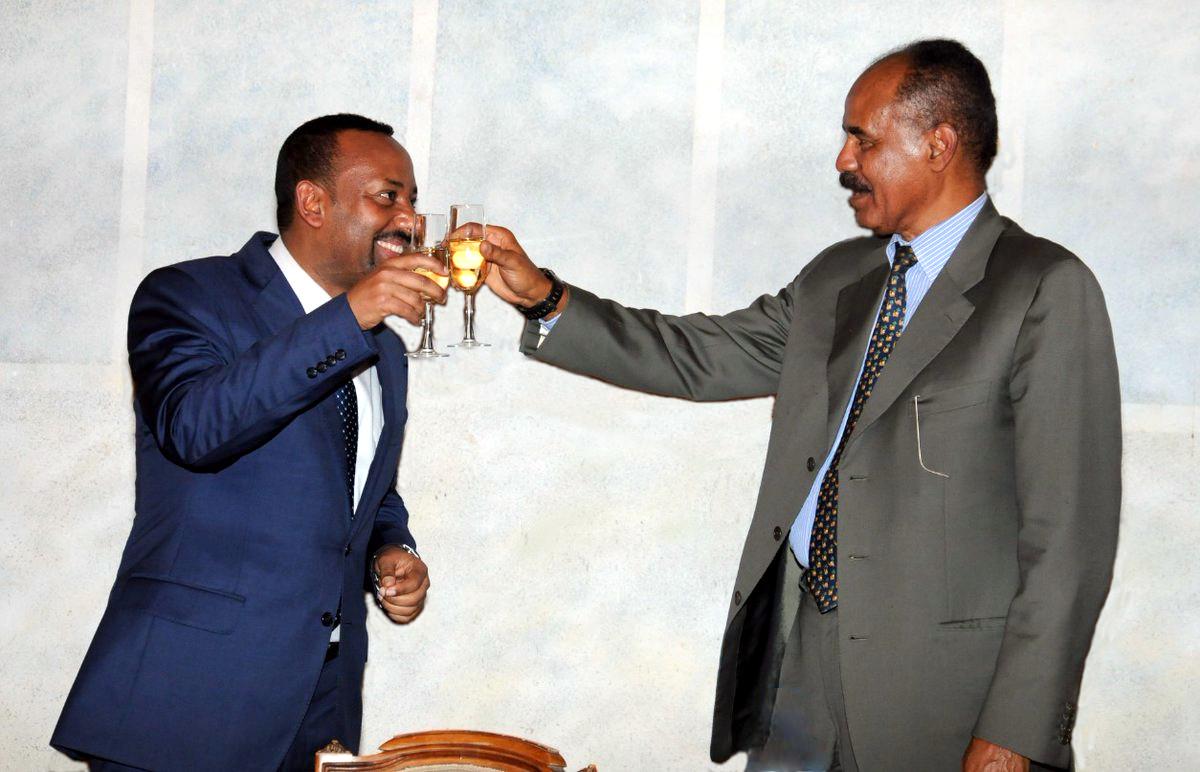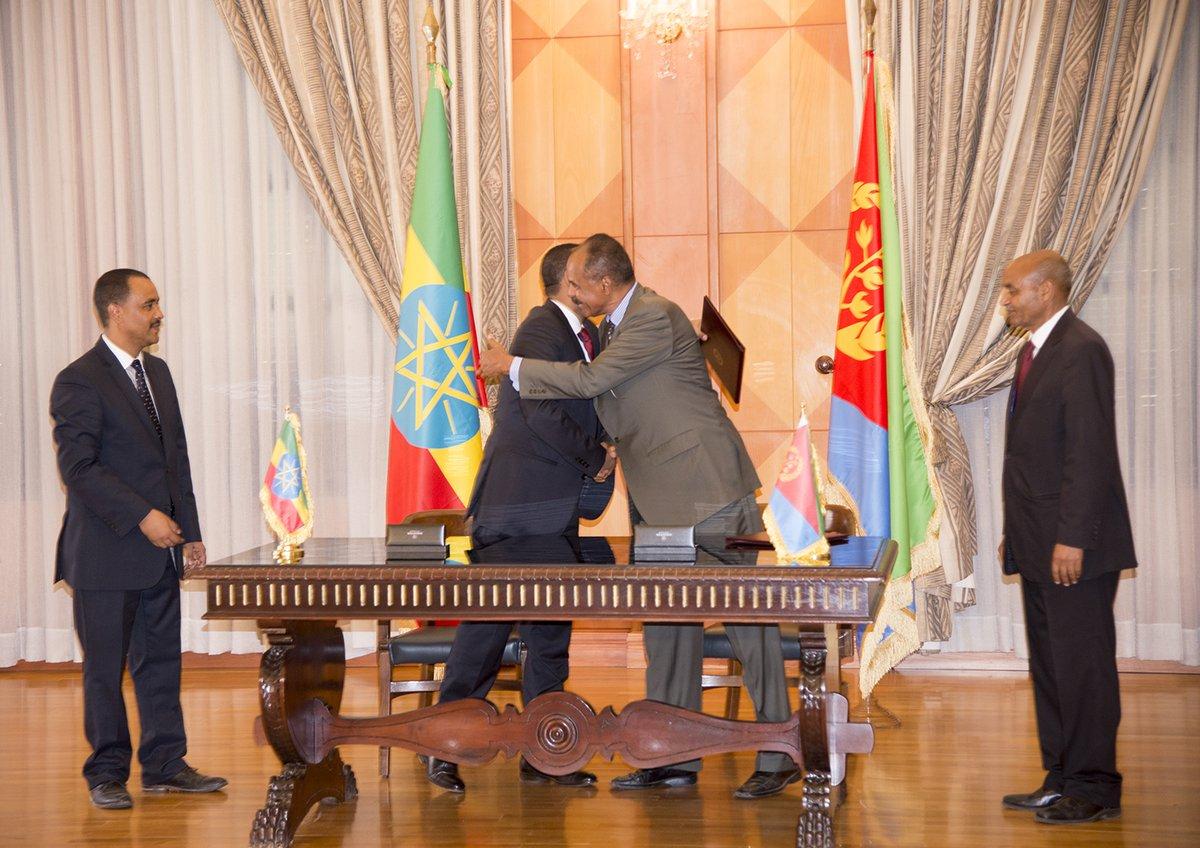In barely the blink of an eye, Eritrea’s unpredictable president has completely reversed his rhetoric of the past two decades.
Ethiopia’s PM Abiy Ahmed and Eritrea’s President Isaias Afewerki at an official dinner in Asmara. Credit: Yemane Gebremeskel, Minister of Information, Eritrea.
In just a few weeks, relations between Ethiopia and Eritrea have not just shifted dramatically but – in many ways – turned upside down.
For two decades, President Isaias Afwerki had demonised Ethiopia, seeing it as an existential threat. He used the supposed Ethiopian menace as a pretext to establish one of the world’s most repressive regimes, ban widespread freedoms, and impose indefinite military conscription. Some of the only bits of music to get official approval from Asmara were toxic war songs that reinforced this all-encompassing enmity on which the nation’s identity was based.
Now, this could not have flipped more completely. In the past month, Ethiopia’s Prime Minister Abiy Ahmed and President Isaias have embraced warmly in both Asmara and Addis Ababa, greeted by huge doting crowds. Eritrean praise-singers have literally changed their tunes to praise peace in Amharic and Tigrinya. Today, the between the two countries in 20 years landed in Asmara, carrying a fully-booked plane that included Ethiopia’s former Prime Minister Hailemariam Desalegn.
In barely the blink of an eye, full-throated enmity seems to have turned into whole-hearted love – to the extent that hopeful Eritreans, whose lives have long been determined by the mood of one man, are starting to worry.
Given the opaque way in which the regime governs, Eritreans are used to following Isaias’ words and actions carefully in search of any hints. But for even those unaccustomed to observing him, his recent performance in Ethiopia was startlingly. He appeared , praising the leader of his long-time foe excessively, and proclaiming that the two nation’s populations are “one people”. He then remarkably Abiy “you are our leader” and happily to the crowd: “I’ve given him all responsibility of leadership and power”.
It was not long ago that it was almost unthinkable that Isaias – a man who played a leading role in Eritrea’s battle for independence and based his leadership on the need to protect against Ethiopia – might one day shake hands with his counterpart in Addis. But now, some Eritreans are afraid that the president might be about to declare Eritrea reunited with Ethiopia.

PETITIONS have reportedly been started and demonstrations called. There are claims being circulated on social media that certain army commanders have said that Isaias has compromised Eritrea’s national interest and should not be allowed home.
Amidst all this uncertainty, one thing that is clear is that the former status quo has been broken. So many of the regime’s actions were justified by referring to Ethiopian hostility, but this pretext no longer exists.
If we are to follow the logic previously laid out by Isaias, Eritrea should now be able to undergo a dramatic and rapid transformation. There have already been some swift changes, such as the opening up of telecommunications and flight routes, but there ought to be much more to come.
There should, in theory, no longer be the need for such a large army and the oppressive system of indefinite military service. Political prisoners and jailed journalists should be freed now they no longer pose a national security threat as the government had claimed. The border should be opened up and trade resumed. And people should be allowed to move freely both within and out of the country.
Eritreans are eagerly listening out for any signs that these moves may be coming, but the government is remaining characteristically quiet on these fronts. If it were to try to resume normal life in the country, however, it would take quite some time. Thanks to the government’s short-sighted and reclusive policies for two decades, the state has been reduced to a mere shell. Institutions have been dismantled over the years and power has been concentrated into the hands of a few. Those with authority are old and incapable of overseeing dynamic change, while the country loses thousands of young people every month as they flee across the border.
If Isaias is genuine in his desire for change, he could use the justification that “new blood” is needed – as he did in 1994 – to overhaul the government, removing senior officials and go after those accused of corruption. He might also place the blame for abuses and mistakes on military commanders and dispose of them. He could try to transfer power to the next generation. But he would face the problem that there is huge gap between the old and young, while decades of alienation have made most people feel like mere observers in their own affairs.
Finally, even with all these changes, the elephant in the room would remain: the same capricious individual responsible for creating one of the world’s most repressive regimes – involving systemic torture, the imprisonment of opponents and much more – would still reign supreme.
In reality, the only way that Eritrea can meaningfully move forwards now is for President Isaias to step down after a quarter of a century in control. If he did take such a courageous step, he might be remembered for playing a positive role in Eritrea’s history. Both of these things seem unthinkable. But recently, the unthinkable has been happening.
It is astonishing how fast positive change can develop if there are people dedicated to bringing it about. Abiy Ahmed was sworn in as Ethiopia’s prime minister only three months ago, but he has already announced a whole host of economic and political reforms, freed hundreds of political prisoners, and initiated a peace process with the Ogaden National Liberation Front. And now he has taken the first concrete steps to ending one of Africa’s most protracted conflicts: the Eritrean-Ethiopian border war.
The war took place from 1998 to 2000, centring on Eritrea’s claim on the territory around the town of Badme. About 100,000 soldiers and civilians on both sides were killed and while both government submitted themselves to neutral arbitration in the Algiers Agreement, Ethiopia didn’t accept the final ruling. The border has remained closed ever since and been a frequent flashpoint of armed confrontation. The conflict has also bled into the region with each side accusing the other of supporting rival armed groups.
Enter Prime Minister Abiy. After unexpectedly announcing on 5 June that Ethiopia would fully comply with the arbitration judgement and a bit of shuttle diplomacy between Asmara and Addis Ababa, he flew to Asmara on 8 July to sign a full peace agreement with his counterpart President Isaias Afewerki. Embracing, the two leaders announced that “airlines will start operating, the ports will be accessible, people can move between the two countries and the embassies will be opened”.
While many details will have to be sorted out, this is unfettered great news. Already, phone calls can be placed between the countries for the first time in 20 years. The potential of this development is enormous, ranging from an economic shot in the arm by allowing for free trade between the two nations to a substantial reduction in the risk of armed conflict in the region.
But of course, some unknowns remain. Among the most important:
- Having lost tens of thousands of men, compromise on the control of Badme used to be anathema to the military establishment of Ethiopia. Abiy has already sidelined the generals politically and, to an extent, economically. He is gambling that his strong public support will limit the old guard’s options to counter his reforms and he may well be right, but it remains a gamble.
- Landlocked Ethiopia will get access to an Eritrean port as part of the agreement. It is simultaneously working to secure access to a Somaliland port and encouraging the development of the Lamu corridor in Kenya, while it has modernised the railway linking it to its traditional transit port in Djibouti. Abiy is clearly looking to diversify the country’s vital access routes. The geo-political ramifications of this regional economic offensive , especially regarding the regional aspirations of Arab states and Turkey, will be interesting to watch.
- While Abiy is clearly looking to open the political space in Ethiopia, no word was said during the peace summit about Eritrea’s abysmal human rights record. For Eritrea’s Afewerki, open borders are risk: the economic returns might secure his regime financially, but free commerce and movement of people will limit the strict control he enjoys over political life in Eritrea. This provides for plenty of potential for internal conflict, which could in turn sour the new detente with Ethiopia.
No comments:
Post a Comment